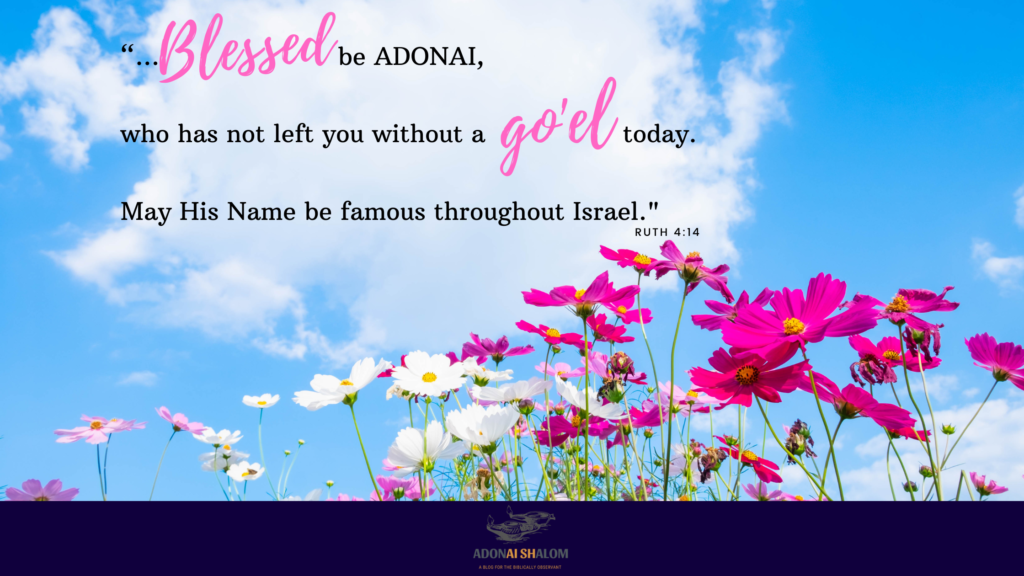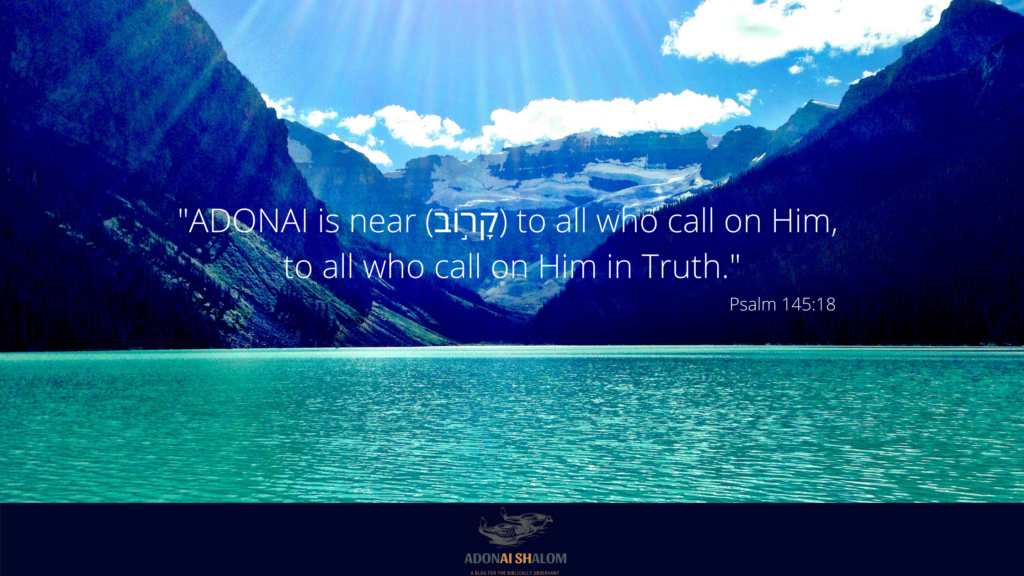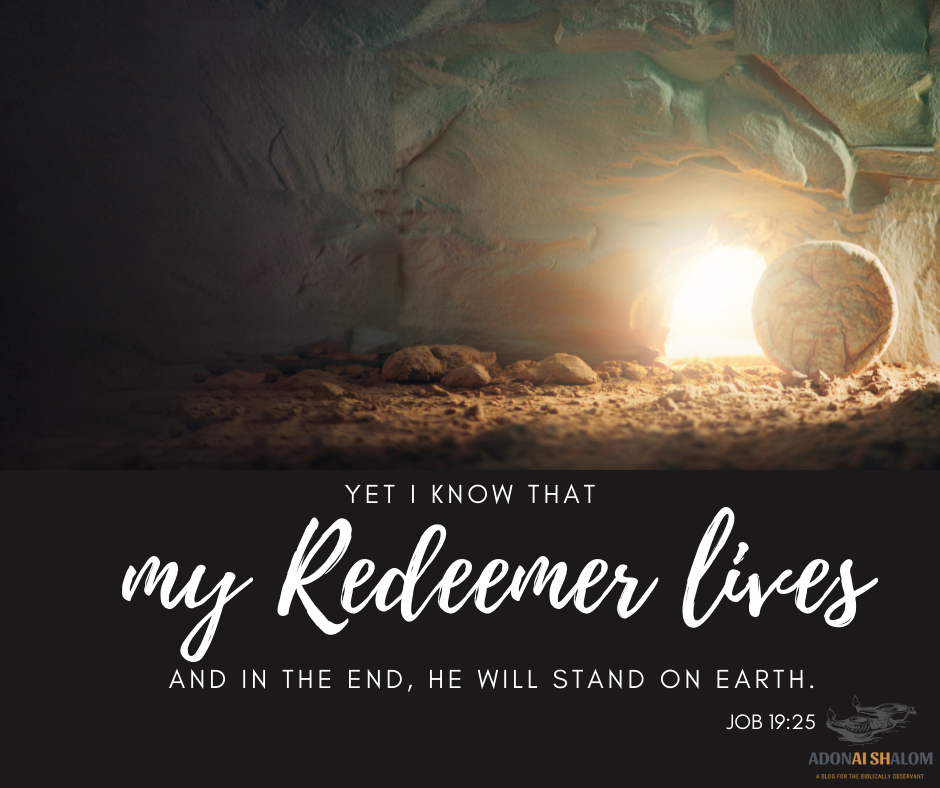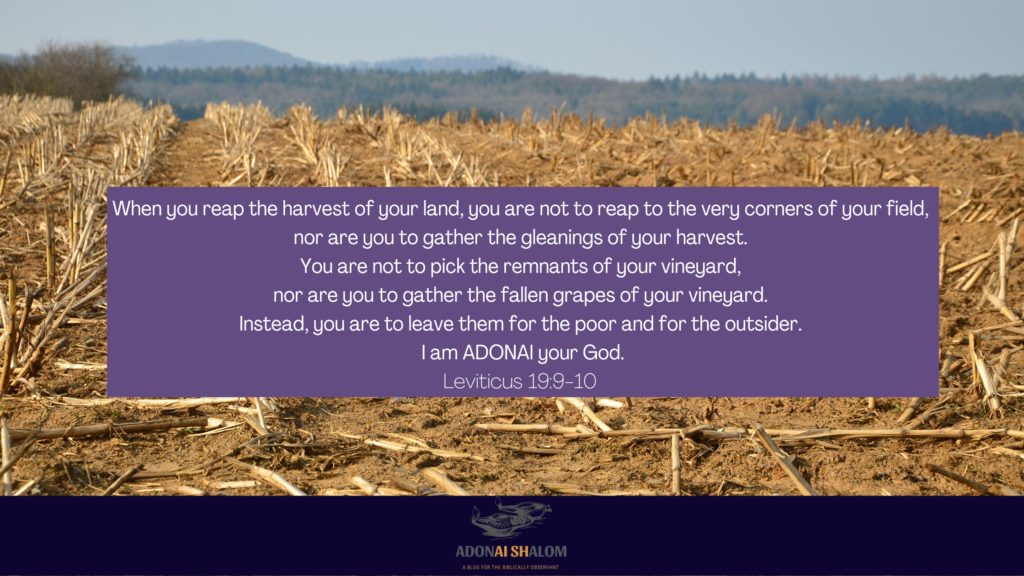Our Redeemer: the One who is Near
Parashat B’har (V’yikra/Leviticus 25-26:2) 5782 B”H
In Leviticus 25:25-28, we read a passage that quickly brings to mind Ruth and Boaz:
“If your brother becomes poor and sells some of his property, then his nearest kinsman may come and redeem what his brother has sold. If a man has no kinsman-redeemer, but he himself recovers and finds sufficient means to redeem it, then let him reckon the years since its sale and restore the surplus to the man to whom he sold it. Then he will return to his property. But if he is not able to get it back for himself, then what he has sold is to remain in the hand of the one who has bought it until the Year of Jubilee. Then in the Jubilee it should be released, so he may return to his property." Lev.25:25-28, TLV
This passage contains a very significant Hebrew word: go’el
Are you at all familiar with this term? It is incredibly central to understanding redemption!
גֹּאֵ֑ל Hebrew: go’el.
Go’el translates to “kinsman-redeemer” or “redeeming relative.”
Yeshua (Jesus) is our relative. He is so closely related to us that He qualifies as our kinsman-redeemer.
In a sense, this is obvious, but if you really spend a moment to meditate on this fact, I am sure you will be touched by how truly glorious it is that our Savior is our relative.

Redemption was only possible if certain parameters were met.
The nearest kinsman had a choice. He could freely choose whether or not he wanted to redeem his brother. Ruth’s first-in-line kinsman redeemer actually rejected the proposition. Initially, he was interested, but once he realized he would have to marry Ruth and also take on the obligation to care for the widowed Naomi as well, he decided not to go through with the redemption.
He was concerned that he could endanger his inheritance, perhaps fearing things would be divided among a large family if he were to serve as redeemer. We do not know his reasons, but they may well have been financial. Boaz was probably wealthier and in a better position to take on the Redeemer-responsibility of a wife and mother-in-law.
Then Boaz took ten of the town’s elders and said, “Sit down here,” so they sat down. Then he said to the goel, “Naomi, who has returned from the region of Moab, is selling the parcel of land that belongs to our brother Elimelech. I thought I should inform you saying, ‘Buy it in the presence of the people sitting here, and in the presence of the elders of my people. If you want to redeem it, redeem it. But if it will not be redeemed, then tell me, so that I can know, because there is no one else in line to redeem it. I am after you.’” “I will redeem it,” he said. Then Boaz said, “On the day you buy the field from Naomi’s hand, you will also acquire Ruth the Moabitess, the wife of the deceased, in order to raise up the name of the deceased over his inheritance.” The kinsman said, “Then I cannot redeem it for myself, or else I might endanger my own inheritance. You, take my right of redemption for yourself, for I cannot redeem it.” Now in the past in Israel, one removed his sandal and gave it to another, in order to finalize the redemption and transfer of a matter. This was a legal transaction in Israel. So the kinsman said to Boaz, “Buy it for yourself,” then took off his shoe. Boaz announced to the elders and all the people: “You are witnesses today that I have bought from Naomi all that belonged to Elimelech and all that belonged to Chilion and Mahlon. Moreover, I have acquired Ruth the Moabitess, the widow of Mahlon to be my wife in order to raise up the name of the deceased over his inheritance, so that the name of the deceased will not be cut off from his brothers or from the gate of his town. You are witnesses today.” Ruth 4:2-10
The one in need of redemption is described in the Bible as “having become poor.”
You and I are spiritually bankrupt without the LORD, but He freely chose to redeem us out of our spiritual poverty.
“Becoming poor” means that we started out ok, but something, ie. the fall, happened to separate us from the LORD. If you have done something that makes you feel “less than” or completely “unworthy” or “unable” to “attain” salvation, know this: your poor condition doesn’t have to define your future.
Sin creeps in with the intent of robbing us of relationship with our Merciful Savior, but if you will confess your need and reject sin, you reject spiritual poverty. You can’t earn a place at His banqueting table, but you can accept His generous gift of mercy. He can set you free today from your fears, your anxiety, from anything that is between you and Him. The LORD wants to redeem you today!
The One who is Near
גֹֽאֲלֹו֙ הַקָּרֹ֣ב The full Hebrew description in Leviticus 25:25 for an individual to bring redemption to their “poor brother” is “go’el haqarob.”
קָרוֹב Hebrew: qarob. This means “near.”
“Kinsman” in Hebrew then could be expressed as one’s “near one.” Someone near and dear to you.
Forms of this same verb are used throughout the Psalms to express the nearness of God.
"ADONAI is near (קָר֣וֹב) to all who call on Him, to all who call on Him in truth." Psalm 145:18 (TLV)
The LORD is near, the LORD is qarob – He is near to you when you call on Him in Truth.
He is near, qarob, as your next-of-kin. He is Elohim qarob, the God who is near.
You are part of the family of God, and He, your Savior, redeems you as your kinsman-redeemer.
Yeshua (Jesus) is your Brother and His Father is your Father, too.

Our Redeemer Lives and He is Near
“For what great nation is there that has God so near to it, as the LORD our God is to us, for whatever reason we may call upon Him?" Deut.4:7, NKJV
Here again, a form of the term “qarob” is used to describe the spectacular Truth that our Redeemer God is near to us. Who else is so privileged to have God on their side? The LORD is with His nation, Israel; we are members of this holy nation. He not only protects and guides us, He is so near to us, nearer than our own breathing. He is not some distant god. He is not powerless, He is not uninterested in our future. He is deeply involved in our day-to-day lives because He cares for us so profoundly. And whenever we call upon His Name, He is listening. What a privilege!

Our Redeemer lives and He is near to us. Our slavery to sin is ended, our inheritance is restored, and we await our Bridegroom’s return.

Here are some encouraging songs about our Redeemer for you that you may enjoy listening to today!
We used to sing this song, “My Redeemer Lives” during praise time at a wonderful church I attended when I was first saved. It is a song sure to bring you some joy today!
“My Redeemer Lives” by Nicole C. Mullen is another encouraging song about our redemption.
“There is a Redeemer (Love has won)” by Darlene Zschech will usher you in to worship of our Great Redeemer!
You have an invitation to meet our Kinsman-Redeemer
Let me reiterate that God isn’t some distant, far-off jeffersonian god.
He is near, and His return is likewise near.
He has invited you beyond gleaning in some far away fields. He invites you to draw near to Him because you are His beloved. He is the King of all kings, and He owns everything because He made everything. He will pour out the richness of His grace upon you and prosper you in your daily living. He will heal you and restore you, and yes, redeem you. He is your Father, and He wants to be in relationship with you, His precious child.
Will you accept His invitation today?
Will you draw near to Him and allow Him to bless you today?
If you have questions about just who is this God of Israel, please write to me. I would love to share more with you about our Messiah’s love. You can leave a comment below or send an email to [email protected]. Subscribe to our newsletter to get encouragement sent straight to your inbox. If you already know the LORD, share a testimony about when you came to know your Redeemer to encourage others! Shalom!
